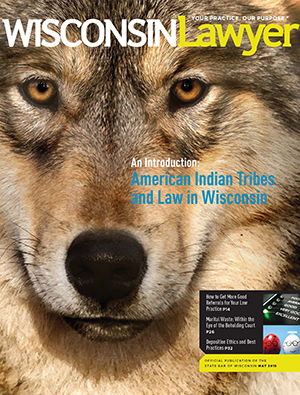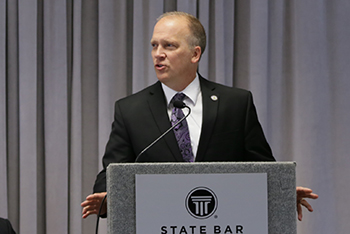Make Wisconsin LawyerBetter, Please Respond to Our Survey
 So, how are we doing?
So, how are we doing?
If you’re a State Bar of Wisconsin member who recently received the 2015 Readership Survey by email in early June, please take 10 minutes to give us your honest, thoughtful opinion about this publication. We, along with 10 other Wisconsin lawyers, serve on this publication’s editorial board.
Two years ago we kicked off a new look and fresh content mix for the print and online Wisconsin Lawyer™ magazine. Each issue, we strive to deliver a magazine that informs you about developments impacting your practice, profession, and career. We hope the content inspires you to be a better lawyer.
What can we do better? Tell us. The online survey closes on Friday, June 19. If you have questions about the survey, please contact Fred Petillo, market research manager, (800) 444-9404, ext. 6162, or email fpetillo@wisbar.org. If you didn’t receive the survey, we welcome your input – anytime. Contact us or the editorial staff at wislawmag@wisbar.org.
Thanks in advance for the generous gift of your time!
Atty. Douglas Frazer, Brookfield
Chair, Communications Committee
Atty. Susan Schaubel, Sheboygan
Vice chair, Communications Committee
Are You an Artist? Represent One? Special Issue on Lawyers & the Arts Coming Next Spring
 Are you an artist as well as an attorney? Do you represent writers, musicians, or other artists with intellectual property, contracts, and other business issues? Galleries? Museums? Performers and their venues? The Wisconsin Lawyer editorial board is working on a special focus issue on Lawyers & the Arts next spring, and we’d like to hear from you.
Are you an artist as well as an attorney? Do you represent writers, musicians, or other artists with intellectual property, contracts, and other business issues? Galleries? Museums? Performers and their venues? The Wisconsin Lawyer editorial board is working on a special focus issue on Lawyers & the Arts next spring, and we’d like to hear from you.
If you’re interested in being part of this issue, tell us your how you’re involved in the arts and entertainment industry and what readers will learn from your experiences. Please contact us at wislawmag@wisbar.org. Thanks in advance for your input.
Joyce R. Hastings
Editor
Karlé A. Lester
Managing editor
Here’s What You May Have Missed
Not connecting with us online? This month we highlight readers’ comments posted to online articles. Let’s hear what you have to say. Post comments to WisBar News, InsideTrack, and Wisconsin Lawyer articles or respond to Facebook, LinkedIn, and Twitter posts. Or simply email the editors at wislawmag@wisbar.org.
Is Restrictive Covenant Reform Bad Public Policy?
 Author Bradden C. Backer in “As I See It: Why the Pending Wisconsin Restrictive Covenant ‘Reform’ is Bad Public Policy” (May 6, 2015, InsideTrack), offered his perspective about the negative public policy implications of the legislative effort to change Wisconsin statutory and common law respecting noncompetes and other restrictive covenant agreements. He wrote to supplement Daniel Finerty’s article, “Sweeping Restrictive Covenant Reform Introduced in the Wisconsin Legislature” (April 1, 2015, InsideTrack). Additional readers weighed in.
Author Bradden C. Backer in “As I See It: Why the Pending Wisconsin Restrictive Covenant ‘Reform’ is Bad Public Policy” (May 6, 2015, InsideTrack), offered his perspective about the negative public policy implications of the legislative effort to change Wisconsin statutory and common law respecting noncompetes and other restrictive covenant agreements. He wrote to supplement Daniel Finerty’s article, “Sweeping Restrictive Covenant Reform Introduced in the Wisconsin Legislature” (April 1, 2015, InsideTrack). Additional readers weighed in.
InsideTrack: I do not comment on the general policy of current law or the proposal. One thing I like about the proposal is that it makes an effort to have confidentiality clauses treated as part of a noncompetition agreement. As I understand current case law, restrictions on opening up shop across the street are given one level of analysis, but restrictions on using knowledge gained in employment are given a different analytical approach. I do applaud the proposal’s apparent attempt to treat both types of restrictions on competition as worthy of the same standard of analysis.
Atty. John M. Gallo
Houseman & Feind LLP, Grafton
InsideTrack: Well said, sure to be ignored. As a practitioner in this area, like Brad, I see real consequences even to the restrictive covenants that are out there now. The Wisconsin Supreme Court just ruled in Runzheimer International Ltd. v. Friedlen, 2015 WI 45 (April 30, 2015), that restrictive covenants are enforceable, even when imposed on at-will employees during their employment, on threat of firing. Combining the Runzheimer ruling with the new legislation, expect that:
We Want to Hear from You! Submit a Letter to the Editor
Wisconsin Lawyer provides a forum for members to express ideas, concerns, and opinions on law-related subjects. Send comments to wislawyer@wisbar.org (include “Letters” in the subject line), or mail to Wisconsin Lawyer “Letters,” P.O. Box 7158, Madison, WI 53707-7158. Limit to 500 words. Writing guidelines available.
1) Wildly expansive noncompete “agreements” will be imposed on virtually all employees with any real responsibility, which they will be told to sign or be fired; and
2) Those who sign, who at best if you agree with Justice Abrahamson’s concurrence, are promised only a “reasonable” time for employment continuation after signing (as opposed to sign and then be fired instantly, as it is presently legal to do to at-will employees in Wisconsin), will be stymied, unable to change employment in their field, whether they continue to work for the employer or not.
Think about the consequences. There will be no skilled employee lateral movement, period. The employer will have indomitable market/bargaining power over the restricted employee’s compensation. (There is no market for the employee’s restricted services elsewhere – what do you think the employer is going to do if it doesn’t have to pay well to retain the employee, who has no options for employment elsewhere in his or her field?)
Lawyers generally aren’t sensitive to this because the SCRs and case law do not allow restrictive covenants in lawyer employment (on the theory that clients need freedom of lawyer choice). So what do we care?
Brad’s question “Why” is easily answered. Large business/employer interests are over-represented in all the halls of state government – governor, both houses of the legislature, attorney general, and more than half of the supreme court. This complete overreach and uncalled for massive change to 90 years of Wisconsin progressive laws is just another sad example of how elections have consequences, and how in this political time, there is no longer any middle ground or appetite to protect workers or free competition in this state. I agree with Brad that this new proposed law along with the Runzheimer decision will encourage any skilled employee to avoid working in Wisconsin.
Atty. Stephen E. Kravit
Kravit, Hovel & Krawczyk S.C., Milwaukee
Wisconsin’s Opiate Problem Is Top Priority
 Speaking at the State Bar Board of Governors meeting in April, Attorney General Brad Schimel said, “In many counties, including Milwaukee, you are more likely to die from an accidental heroin overdose than a traffic crash. We have watched the number of opiate-related overdose deaths quadruple in the last decade.” (See “Attorney General Schimel Tells State Bar Board: Opiate Problem Is Top Priority,” April 24, 2015, WisBar News.) A reader commented.
Speaking at the State Bar Board of Governors meeting in April, Attorney General Brad Schimel said, “In many counties, including Milwaukee, you are more likely to die from an accidental heroin overdose than a traffic crash. We have watched the number of opiate-related overdose deaths quadruple in the last decade.” (See “Attorney General Schimel Tells State Bar Board: Opiate Problem Is Top Priority,” April 24, 2015, WisBar News.) A reader commented.
WisBar: I agree that Wisconsin has a very real problem with opiates. However, the western part of the state is experiencing a troubling uptick in methamphetamine, particularly in areas such as Lafayette County. Meth is pandemic here in Oklahoma, and one does not require a doctoral degree in rocket surgery to be an accomplished cook.
Atty. Tim Kittle
Keesling Law Group PLLC, Tulsa, Okla.
